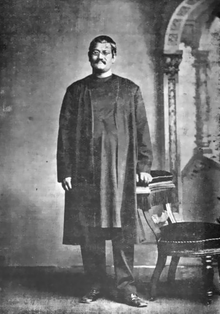Keshub Chandra Sen
| Keshab Chandra Sen | |
|---|---|

Keshab Chandra Sen
|
|
| Born |
19 November 1838 Calcutta, British India (now Kolkata, West Bengal, India) |
| Died | 8 January 1884 (aged 45) Calcutta, Bengal Presidency, British India |
| Nationality | British Indian |
| Alma mater | Hindu Metropolitan College |
| Occupation | Gentleman |
| Known for | Religious preacher, social reformer |
Keshab Chandra Sen (Bengali: কেশবচন্দ্র সেন, Keshob Chôndro Shen) (19 November 1838 – 8 January 1884) was an Indian Bengali Hindu philosopher and social reformer who attempted to incorporate Christian theology within the framework of Hindu thought. Born a Hindu, he became a member of the Brahmo Samaj in 1856 but founded his own breakaway "Brahmo Samaj of India" in 1866 while the Brahmo Samaj remained under the leadership of Maharshi Debendranath Tagore (who headed the Brahmo Samaj till his death in 1905). In 1878 his followers abandoned him after the underage child marriage of his daughter which exposed his campaign against child marriage as hollow. Later in his life he came under the influence of Ramakrishna and founded a syncretic "New Dispensation" or Nôbobidhan inspired by Christianity, and Vaishnav bhakti, and Hindu practices.
Keshab Chandra Sen was born on 19 November 1838 into an affluent Vaidya family of Calcutta (now Kolkata). His family originally belonged to Gariffa village on the banks of the river Hooghly. His grandfather was Ramkamal Sen (1783–1844), a well known pro-sati Hindu activist and lifelong opponent of Ram Mohan Roy His father Peary Mohan Sen died when he was ten, and Sen was brought up by his uncle. As a boy, he attended the Bengali Pathshala elementary school and later attended Hindu Metropolitan College in 1845.
...
Wikipedia
